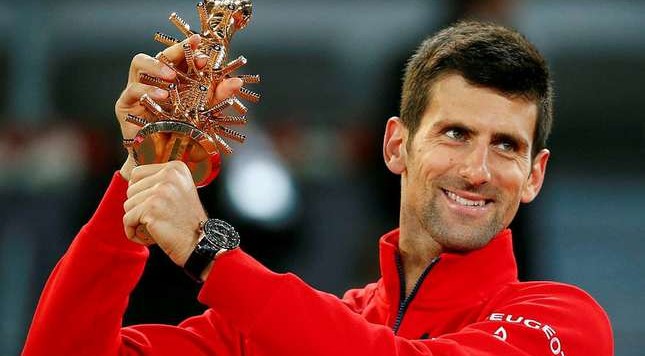The official record will state — for anyone and everyone who looks up the result in subsequent years — that Novak Djokovic defeated Andy Murray on Sunday for his latest Masters 1000 championship in Madrid.
Unofficially, the man Djokovic most centrally defeated at La Caja Magica was Djokovic himself.
The World No. 1 has won many tennis matches — and many of his now-record 29 Masters 1000 titles — in the manner displayed on Sunday evening in Spain. Djokovic sometimes labors through a match rather than sweeping through it with terrifying tornadic ruthlessness. He sometimes litters the court with mistakes and appears to be manifestly uncomfortable. He staggers into a final set and prolongs a feeling of genuine suspense. Yet, just before the finish line, Djokovic finds his footing and walks off the court a winner.
Nole did this in Australia against Gilles Simon four months ago, and he did so again versus Murray on Sunday. He prevailed over himself; his Scottish opponent; and one of the ATP Tour’s least trustworthy surfaces, the hardened and elevated clay which doesn’t play the way crushed red brick plays in Monte Carlo, Rome, or Paris.
Djokovic — being the legend he in fact is — should receive a lot more credit in general for being an artistic player, a shotmaker who delivers plenty of magical moments on court. Yet, after this week in Madrid, Djokovic left the tennis community with a reminder that after 1.5 years of barely-interrupted dominance, he can still win a close and ugly match when he needs to.
This wasn’t boring, tennis fans. It wasn’t routine or straightforward — not in light of the way Djokovic lost the second set against Murray. This wasn’t the snoozefest Indian Wells final or the barely-more-interesting Miami final in which Djokovic easily captured a two-set win by dint of being superb. This was a close match, but it was a close match more because Djokovic struggled than because Murray excelled.
Madrid, for these and other related reasons, reminded tennis fans that the relationships among various terms — close, boring, high-quality, predictable — are never fixed. They all change positions or dimensions (or both) depending on a large basket of circumstances.
Lopsided matches can be extremely high in quality. See “Kvitova d. Bouchard” in the 2014 Wimbledon ladies’ singles final.
This was just the opposite in Madrid: “Djokovic d. Murray in three” suggests the mightiest heavyweight scrap, but it unfolded in a manner consistent with an lower-undercard fight between welterweights.
That point aside, however, let’s reassert something very important: Just as Djokovic deserved ample plaudits for being so great that he could destroy everyone in his path in Indian Wells and Miami, he deserves similarly abundant praise for reminding us that he can still put on his inner Brad Gilbert and win ugly.
The greatness of Djokovic for much of the past 1.5 years has been rooted in its transcendence, but every now and then, the World No. 1 is able to get by on his survival skills. The essence of Djokovic at his height is this: Nole wins in just about every competitive context or circumstance. The very best produce just such a track record, and that resume was reinforced by Djokovic in Madrid.
*
For Murray, there’s nothing new to say, even in the wake of Monday morning’s subsequent news concerning his coaching situation:
Statements from each of Andy Murray and Amelie Mauresmo on the conclusion of their groundbreaking partnership: pic.twitter.com/2mwjM3IDx0
— Ben Rothenberg (@BenRothenberg) May 9, 2016
Murray is the king of the very kind of tournament he just fashioned in Madrid:
* He makes the final, so you can’t say he did poorly.
* He loses in the final, so you can’t say his tournament was a complete success.
* He loses the final or makes the final in a way which leaves observers thinking that he should have or could have done more.
* Flowing from that previous point, Murray’s moments of dazzling brilliance make the community of fans and pundits wonder why his lulls and slumps are low enough and long enough to cost him.
It’s worth noting that Murray’s semifinal win over Rafael Nadal was a lower-quality match than his semifinal loss to Rafa in Monte Carlo. Murray’s performance in the one set he claimed against Nadal in Monte Carlo was a million miles better than either of the two sets he won versus the Spaniard in Madrid. If Murray had maxed out against Rafa and had nothing left against Djokovic on Sunday, a lot of commentators would have been more sympathetic to him. However, the reality of a scratchy performance against Nadal — even in victory — pointed to the idea that Murray should have had more in the tank against Djokovic. That he couldn’t offer very much rates as a disappointment.
This pattern — like the notions which accompany it — paints a portrait very similar to what we saw in Australia. Murray got through to the final because of a bit of good fortune in the semifinals, when he was far from his best. He had the chance to pour his best tennis into the final, yet couldn’t do so.
There’s no shame in making the final of a high-stakes tournament; Murray inhabits a world 98 percent of his peers would love to visit from time to time. Yet, even when living at a great height relative to the rest of the ATP Tour, Murray still carries with him the undercurrent of sadness.
That’s a problem Novak Djokovic used to have, five and a half very long years ago.
Nole doesn’t encounter that problem anymore. This past week reminded us why.

